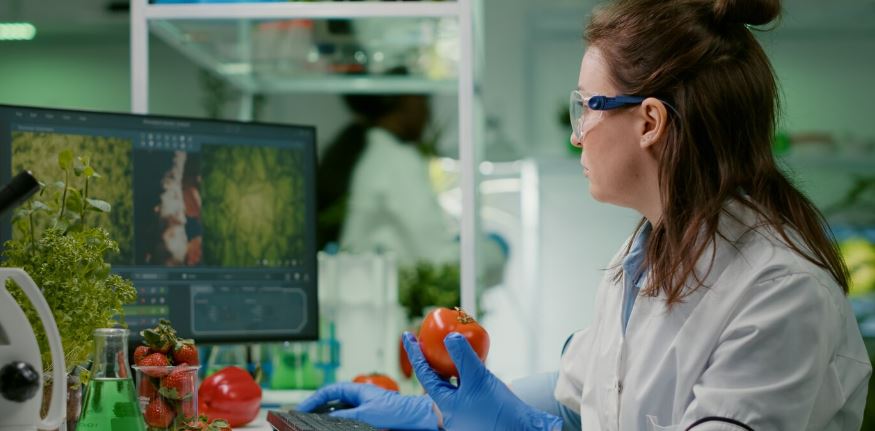By promoting nutritional innovation from the inside out and preserving food quality, food technologists are subtly changing the way we eat. Every plant-based sausage or snack without preservatives is the result of a team of experts who evaluate, test, and optimize ingredients for consumer satisfaction and safety. Despite frequently being undervalued, their pay is now commensurate with the impact they have in the manufacturing, retail, and sustainability industries.
| Food Technologist Salary Breakdown (UK, 2025) | Figures & Notes |
|---|---|
| Apprenticeship/Early Training | £18,000 – £21,000 |
| Graduate Entry-Level | £24,000 – £26,000 |
| Mid-Level/Experienced | £26,000 – £45,000 |
| Senior Management Positions | £50,000 – £65,000 |
| Top Corporate Salaries (e.g. Marks & Spencer) | £55,000 – £75,000 |
| UK Average Annual Salary | £31,976 |
| Highest Paying Locations (e.g. Bristol, London) | £34,000 – £36,000 average |
| Source | Prospects.ac.uk |
In the UK, a food technologist’s financial trajectory reflects both growth and opportunity. Apprentices can start making about £18,000 while gaining practical experience right away, while graduate students usually start between £24,000 and £26,000. Salary scales significantly as professionals advance. Technologists with experience can earn between £30,000 and £45,000 a year. Senior professionals can make over £65,000 at the top end, especially if they work for well-known companies. Companies such as Marks & Spencer offer packages that go up to £75,000 for managerial or specialized positions.
The breadth and depth of food technologists’ work have significantly increased over the last ten years. They were once thought of as lab-bound analysts, but they have since evolved into agile problem solvers who strike a balance between cost and quality, creativity and compliance. They now impact product lifecycles from inception to consumption by working with supply chain engineers, chefs, and sustainability officers.

Food technologists are changing what is sold by forming strategic alliances and developing novel ingredients. Leading FMCG companies like Nestlé and Unilever exhibit a remarkably similar trend, with technologists frequently serving as co-leads of R&D initiatives. These positions are very effective at converting consumer demands into scalable food solutions, such as lowering sodium content or using bio-based preservatives to increase shelf life.
Their influence is palpable in the context of contemporary retail. Think of a senior Marks & Spencer technologist. They are tasked with launching a new line of vegan ready meals and are frequently given accelerated deadlines to assess the nutritional value, sourcing ethics, packaging integrity, and microbiological safety. Their pay, which ranges from £60,000 to £75,000 on average, is commensurate with the responsibility and complexity of these innovation-led positions.
The importance of food technologists was underscored during the pandemic, when supply chains faltered and worries about food safety increased. Many were forced to manage ingredient substitutions, plan for contingencies, and uphold safety regulations in erratic circumstances. Their profile was greatly raised during that time, which also highlighted the tenacity needed to operate at this nexus of science, logistics, and regulation.
Salary trends have begun to reflect this increased recognition in recent days. Salary rates in cities like Bristol, where food tech startups are flourishing, are exceptionally competitive and occasionally surpass those in traditional London. Technologists now have more flexibility thanks to this geographic shift, which is especially advantageous for those looking for positions with niche nutrition or sustainability startups.
Although pay is one aspect of the job, the benefits package is also important. Private health plans, pension plans, performance bonuses, and access to state-of-the-art training are frequently enjoyed by food technologists. Larger businesses may even offer company cars and relocation expenses, particularly for positions requiring regular supplier audits or factory visits.
Apprenticeships have shown remarkable success for professionals in their early careers. In addition to providing a debt-free entry path, they also generate candidates with real-world experience, which is a benefit that frequently expedites career advancement. By the time they move into full-time positions, many apprentices are making wages comparable to those of recent graduates and have a better understanding of food safety regulations and factory operations.
Food technologists are now embarking on a new stage of innovation by incorporating digital platforms such as blockchain traceability or AI-based formulation tools. Because manufacturers are looking for professionals who can bridge traditional food science with tech-enabled efficiency, those who are proficient with these digital tools are seeing a much faster rate of pay growth.
The growth of functional foods—items intended to enhance health outcomes—will generate new sources of income for the industry in the upcoming years. This push is anticipated to be led by technologists with experience in microbiome research or nutrition, who will gain industry recognition and financial incentives. One product at a time, their contributions—which are especially creative and data-driven—are changing consumer wellness.
Food technology is still a creative field despite its technical complexity. It takes much more than formulas to create a low-calorie dessert that tastes decadent or to rethink packaging that is both moisture-proof and compostable; it takes creativity, experimentation, and flexibility. These traits, which are developed over time, frequently determine who advances to senior leadership positions.
The repercussions of this profession on society are especially positive. Food technologists are not only improving industry metrics but also improving lives by reducing food waste through intelligent processing or adding vital nutrients to school meals. It’s an obligation that goes beyond financial gain and is based on sustainability, global food security, and public health.
Food technologists are changing their procedures, equipment, and attitudes in response to each new rule, market trend, or customer demand. Their flexibility, especially in situations that change quickly, guarantees that they will continue to be important participants in a landscape that is changing quickly. The position offers both financial and intellectual rewards as salaries rise and responsibilities change, especially for those who are dedicated to lifelong learning.
